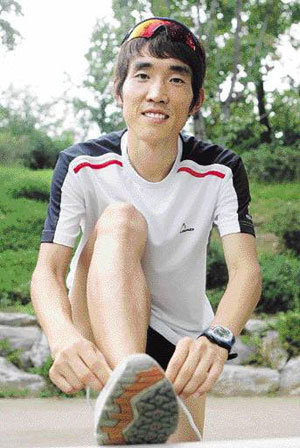Korean Runs for Gold at Asian Games
Korean Runs for Gold at Asian Games
Posted August. 26, 2006 03:22,

Running 6,000 kilometers in training would guarantee a gold medal?
Marathon runners usually train for three months to run a full course of 42.195 kilometers. This means marathon athletes run a total of 3,600 kilometers before games as they run an average of 40 kilometers every day.
Ji Young-jun (25, Kolon), a hope for Korean marathon, set a goal of winning a gold medal in the mens marathon at the 2006 Doha Asian Games to be held in Qatar in December.
Daily training distance of 40 kilometers each day for five months before the Asian Games in December-
Ji started training early on, as he began on July 20. Ji will have undergone training for five months come December when the Asian Games open. This indicates that Ji will have run about 6,000 kilometers for five months before participating in the Asian Games because he trains every day. The total distance for his training is impressively equivalent to 15 times the distance between Seoul and Busan. The Asian Games is of great importance to him.
Ji emerged as a new promising marathoner, setting Koreas third record for current marathoners with two hours, eight minutes and 43 seconds (second place) in the 2003 Dong-A Seoul International Marathon. Ji is now a frontrunner expected to lead the Korean marathon contingent that has lost momentum since Hwang Young-jo (Seoul Olympic Sports Promotion Foundation coach) won a gold medal at the 1992 Barcelona Olympic Games and Lee Bong-ju (Samsung Electronics) took a silver medal at the 1996 Atlanta Olympic Games.
Korea won the championship in the Asian Games four times in a row with Hwang Young-jo (1994 Hiroshima Asian Games) and Lee Bong-ju (1998 Bangkok and 2002 Busan Asian Games) triumphant after Kim Won-tak won the victory at the 1990 Beijing Asian Games.
Poor Performance at the Athens Olympic Games-
Now, the glory and responsibility for the fifth consecutive victory depend on Jis two legs. For his part, Ji also has to resolve the issue of army service that would sway over his marathon life by winning the Asian Games. Ji could be exempt from compulsory military duty if he wins a gold medal in the Asian Games.
Ji said, It is, of course, good to win a gold medal. However, I didnt do well when I was grasping. I will just commit to training.
Ji Young-jun has had a hard time in recent years with poor records of 52nd place (two hours, 20 minutes and 21 seconds) at the 2003 World Championships and 17th place (two hours, 16 minutes and 44 seconds) at the Athens Olympic Games the following year. This was due to a lack of experience and excessive desire, so Ji decided to not pay any more attention to the results.
Intensive Training on Chinese High Plateaus in October-
Ji built up his basic physical fitness and endurance by running on the slope of Daegwanryeong in Gangwon Province for one month since July and will train on high land in Kunming, China, beginning on September 1. Ji will briefly return to Korea at the beginning of October and run in the 5,000-meter and 10,000-meter division at the National Sports Festival and will then resume high land training for 30 days back in Kunming. Training on high plateaus is aimed at enhancing endurance by increasing the ability of hemoglobin to carry oxygen in his blood. High ground lacks oxygen, making training two times as hard as that on level ground. In short, it is the most difficult form of training.
Ji noted, It is hot to run in Doha, Qatar because it reaches 15 to 30 degrees Celsius even in December. Therefore, strength is a key and increasing training is the only way to go.
Ji developed a new perspective of marathons under the direction of the Japanese coach Koichi Nakata, who has been coaching Kolon since last year. Ji learned that a marathon doesnt lie, that records depend on how hard he tries, and that he needs to believe himself.
Even after the Asian Games, Ji will keep running to try and break the current Korean record held by Lee Bong-ju (two hours, seven minutes and 20 seconds), to break into the range of two hours and six minutes and to achieve a gold medal in the 2008 Beijing Olympic Games, which is his supreme goal.
yjongk@donga.com







